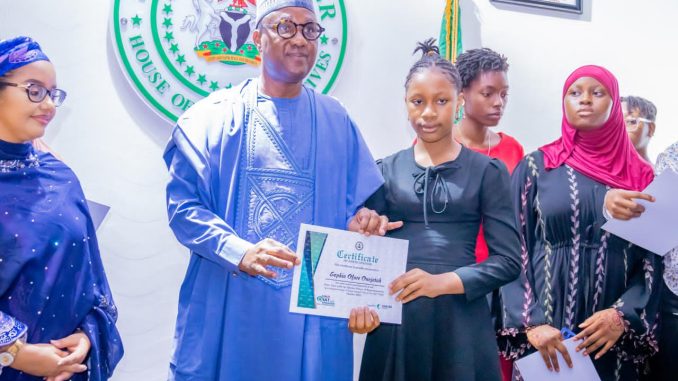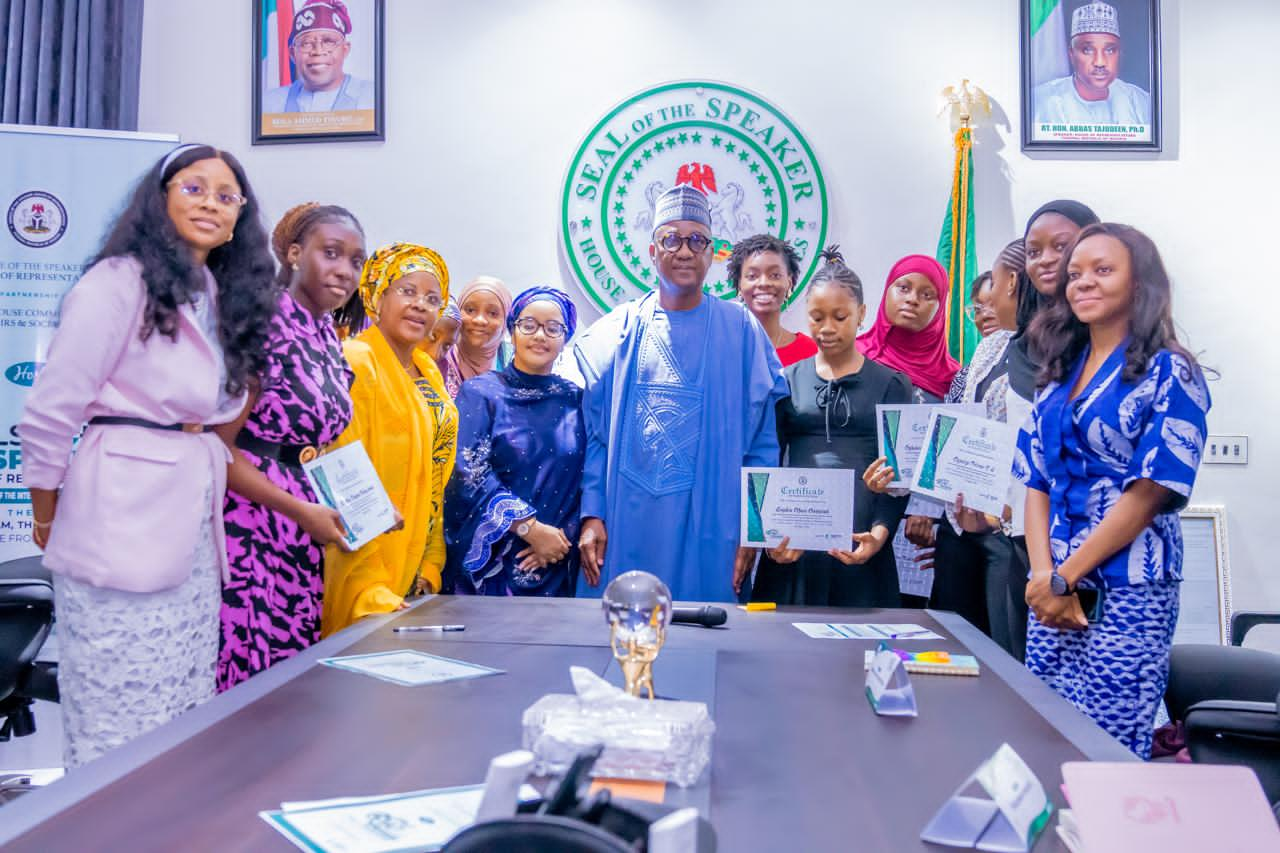
…lists legislative interventions on child labour, child marriage, others…as schoolgirls chat with Speaker, seek rights protection
The Speaker of the House of Representatives Rt. Hon. Abbas Tajudeen, Ph.D. has called for drastic measures against child labour, sexual harassment, gender inequality, forced marriage, and other issues negatively affecting female Nigerians.
This is just as the Speaker assured young Nigerians, especially females, of legislative interventions that will make life easier, safer and better for them.Speaker Abbas gave the assurance in Abuja on Thursday when he hosted young female Nigerians in commemoration of the International Day of the Girl Child, tagged ‘Girls’ Chat with the Speaker.
’The Office of the Speaker organised the session in partnership with the House Committee on Women Affairs and Social Development.At the ceremony were the wife of the Speaker, Hajia Fatima Abbas-Tajudeen; Chairman, House Committee on Women Affairs and Social Development, Hon Kafilat Ogbara; and several senior aides of the Speaker.While October 11 is designated for the International Day of the Girl Child, the theme for the 2025 edition is ‘The girl I am, the change I lead: Girls on the frontlines of crisis.’The Speaker, who usually specially celebrates the girl child, and dedicates time and resources to gender campaigns, on Thursday had an interactive session with schoolgirls.The girls drawn from across the country, mostly teenagers, represented public and private schools at the secondary and tertiary levels.
The girl children, who came tops in an online poll earlier conducted by the Office of the Speaker and an advocacy group, Gender Mobile Initiative, asked Speaker Abbas sundry questions concerning issues affecting young and female Nigerians.While noting that child marriage is on a downward trend due to public enlightenment and advocacy, the Speaker stated that cases of child labour are still on the rise.
He said: “My major concern is girl and child labour which is still endemic in this country. A lot of girls, instead of going to school, are being sent to work in the house of the rich and those who are doing well. This is an area where the National Assembly – the government – must pay extra attention.“We need to ensure that no girl under a certain age is allowed to be seen working as domestic staff in the houses of the well-to-do families. Those children, by implication, are being denied access to education. Not many of those families that are engaging them are allowing them to school at the same time.“A significant number of girls are not allowed to go to school because of that and we need to come up with legislation for stronger laws that will significantly diminish this menace. This is one area of concern.”Speaker Abbas, who said it was “indeed another day of history,” noted that girls in Nigeria are doing better than the boys.He said: “It is very gladdening to say what I see today, particularly from the academic point of view, girls generally in Nigeria are doing a bit better than their counterparts – boys. I see the results from senior secondary schools; I see results from tertiary institutions; I see results from even primary schools, where almost every school you go to, you will find out that the girls are at the top. That is a very promising signal that the initiatives started in 2011 have started bearing fruit.
“We believe there are so many areas to cover but for me, it is a good beginning. I congratulate you girls for the good performances that you have given particularly in the academic sector.
”The Speaker however noted challenges particularly in the rural areas “where girls up till now are not given their rights particularly access to education.”“I believe that with the current efforts being made by the National Assembly as well as the Executive (arm of the government) under the Ministry of Women Affairs, so much will be achieved within the next two years with this administration,” he added.
Responding to the series of questions posed to him, the Speaker stated that the National Assembly, particularly the House, “is doing so much in changing the narratives especially on women’s participation in parliament.” While noting that the House is considering a bill seeking to reserve seats for women and Persons Living with Disabilities (PLWDs).
“The course that we have taken is ensuring that we have more representation of women in parliament because that is where laws are enacted. Once we have more women (in parliament) they will have more say in terms of women’s and girls’ interests. The first and the most significant is to have as many women as possible in the parliament,” he said.

Speaking on sexual harassment in schools, Speaker Abbas noted that “as a teacher, I am privileged to know so much about this endemic abuse. Having been a teacher at the primary school level and at tertiary institutions, I know the extent of the problem we are encountering in that regard. And we are doing the best we can. The major issue is resources to actually get the Acts implemented.“All we need in this country is to set good examples. Once we are able to set good examples of one or two of those culprits, I’m sure others with such tendencies will begin to review their actions.“We will support this initiative of taking the campaign to all the nooks and crannies of the country; to all our tertiary institutions that enough is enough on the issue of sexual harassment of female students particularly by lecturers and other leaders of the institutions. We will not take it anymore. We will do everything possible to ensure that we put a permanent stop to it.”
Earlier, the Executive Lead, Gender Mobile Initiative, Omowumi Ogunrotimi, noted that the 10 girls “represent girls across Nigeria.” She added that there are “millions of girls who are not able to be in this room today and we hope that their questions will represent both the struggles and the aspirations of the millions of girls.”After, Sophia Ofure Onojetah asked about gender equality in politics and governance, especially women’s representation in parliament. Tioluwani Faparusi asked about efforts by the government to curb sexual harassment in schools especially the sexual offences bill.Sabiya Aminu Suleiman asked about child marriage and paedophilic crimes in society.Some girls also asked questions about the enforcement of the Child’s Rights Act at the subnational levels and the fate of children in the Internally Displaced Persons (IDPs) camps.Others asked about safety in schools especially with the infamous abduction of Chibok and Dapchi by terrorists.
There are also questions about girl-focused policies and programmes in Nigeria.Speaker Abbas, who answered all the questions, noted that most of the responsibilities fall with the Executive arm of the government which is responsible for the enforcement of laws.The Speaker however stated that the House will continue to make laws that will protect the rights of Nigerians, men and women, both young and old.






Be the first to comment